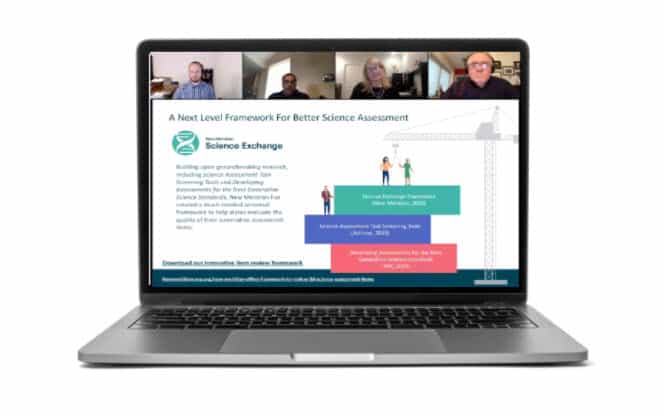
A survey last spring showed that 88 percent of teachers believe students are spending less time on science in virtual school than they were in the classroom, proof that science education amid the pandemic remains a concern for thousands of educators.
So when New Meridian hosted a webinar this week on The Unique Challenges of Science Education in a Post-Pandemic World, it may be no surprise that almost 600 teachers, administrators and education officials gathered to hear what the expert panel had to say.
“One of the things I think we all agree the pandemic has shown us is how important a scientifically literate populace is to our nation,” said Tricia Shelton, director of professional learning and standards implementation at the National Science Teaching Association.
Shelton was joined on the panel by Matt Krehbiel, director of outreach at OpenSciEd; Christopher Lazzaro, director of science at New Meridian; and moderator Jim Pellegrino, a professor of education at the University of Illinois at Chicago.
The experts discussed policy prescriptions to support science education; the need to address equity; how to maintain focus on Next Generation Science Standards (NGSS); and the role of assessment in science education. It added up to a robust discussion of how educators can support science learning, even amid the challenges of the pandemic.
“This program was very informative,” wrote one partiocipant. “The presenters touched on really important issues that are not only at the heart of science but education as a whole.”
Wrote another participant, “Thank you so much for hosting this conversation and sharing these resources with us. We have a unique opportunity to re-envision learning going forward.”
Missed the webinar? Don’t worry. You can download a copy here.
‘A Very Bright Light’
Equity was a big part of the conversation, with more than half the participants naming it as a primary challenge in an informal poll that kicked off the webinar.
“The disruption to science teaching and learning, the trauma of the pandemic and all of the things around it have affected everyone, but it has shone a very bright light on the disproportionate effect for underserved communities and traditionally marginalized students,” Shelton said.
Funding in the latest COVID relief bill before Congress will help, Shelton said, but long-term, recurring funding will also be important. Many audience questions focused on what could be done locally to advocate for resources. Krehbiel, former State Science Supervisor in Kansas, had solid advice.
“Get to know your legislators—call them,” he said. “Having been in the State Department of Education in Kansas for five years, I knew that my Board of Education was listening to the people who got on the phone and talked to them. Make yourself the science education reference person for your legislator.”
The panel also said that technology also plays an important role. The need for universal broadband connection is more important than ever, but so too is the use of technology in the classroom and in assessment.
“The use of technology in measuring what students know and are able to do is obviously key when it comes to science and to assessment,” Lazzaro said. “What students are now able to do in the classroom with a small probe linked to their computer or smartphone is kind of unbelievable. It really allows students to practice science authentically.”
When it comes to assessment, he added, “Technology allows us to assess a wider range of standards.”
‘Really Rich Data’
More than once, the conversation shifted to address the role of assessment in increasing the quality of science education and the implementation of Next Generation Science Standards.
“One of the issues we know that a lot of states and teachers and schools are going through right now is trying to implement the adoption of these new standards,” Lazzaro said. “The ability for us to measure what students know and are able to do is an important component. It’s important that we continue to think through how assessments can feed into the overall system.”
Lazarro noted some of the steps New Meridian has taken to promote standards-based science education and assessment.
The New Meridian Science Exchange, for example, provides states with cost-effective access to high-quality assessment items that are aligned to NGSS. States can draw from the bank of test items to create assessments or contribute items to produce licensing revenue.
New Meridian also released a free universal framework that states can use to review and evaluate test items for science assessments. The New Meridian Framework for Quality Review of NGSS Science Assessment Items, based on well-known industry research, walks states through how to evaluate science assessment content, placing emphasis on items that promote equity and inclusion.
As Lazzaro put it, “We need to look at assessments not as these punitive measures for students … but as a way to collect really rich data on how to support the system overall and move students toward more three-dimensional learning.”
Want to learn more about New Meridian’s science solutions? Schedule a conversation with an expert.


